BSS017-2: Final Report on Sainsbury's Sustainable Business Management
VerifiedAdded on 2022/12/29
|9
|2621
|4
Report
AI Summary
This academic report analyzes Sainsbury's sustainable business management at a regional level, focusing on its impact on the environment, community, and profit. The report, intended for the Green Business Network, examines the company's sustainability practices, including sourcing, community engagement, and environmental initiatives. It highlights opportunities such as expanded sales through product diversification, building business networks, and tax benefits, while also addressing threats like increased costs, regulatory challenges, and supply chain disruptions. The report identifies key issues such as environmental pollution, energy use, and global warming, and provides practical solutions, including adopting cost-effective sustainable technologies, utilizing renewable energy, and improving supply chain management. The conclusion summarizes Sainsbury's commitment to sustainability, emphasizing its impact and suggesting further actions for a more sustainable business model.
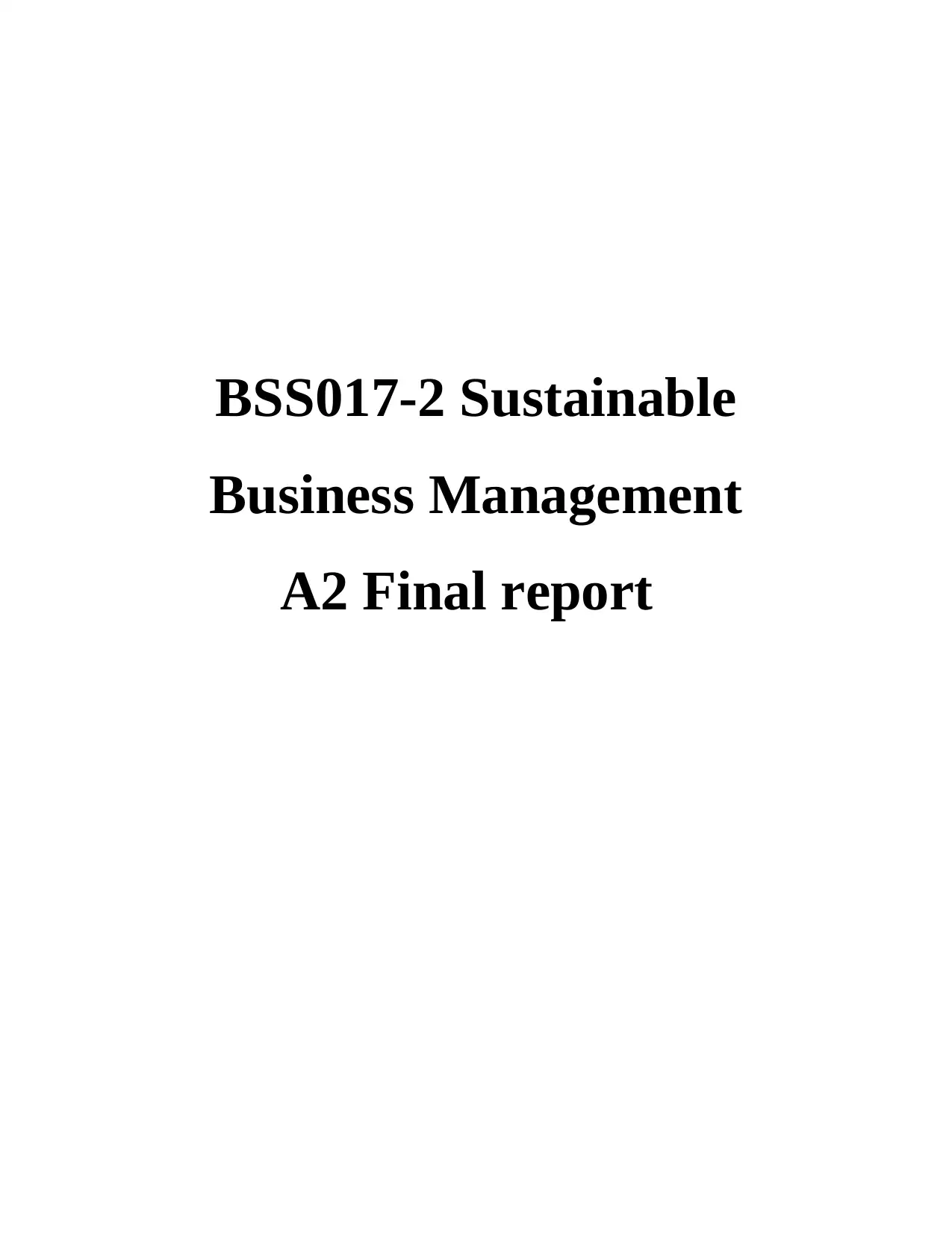
BSS017-2 Sustainable
Business Management
A2 Final report
Business Management
A2 Final report
Paraphrase This Document
Need a fresh take? Get an instant paraphrase of this document with our AI Paraphraser
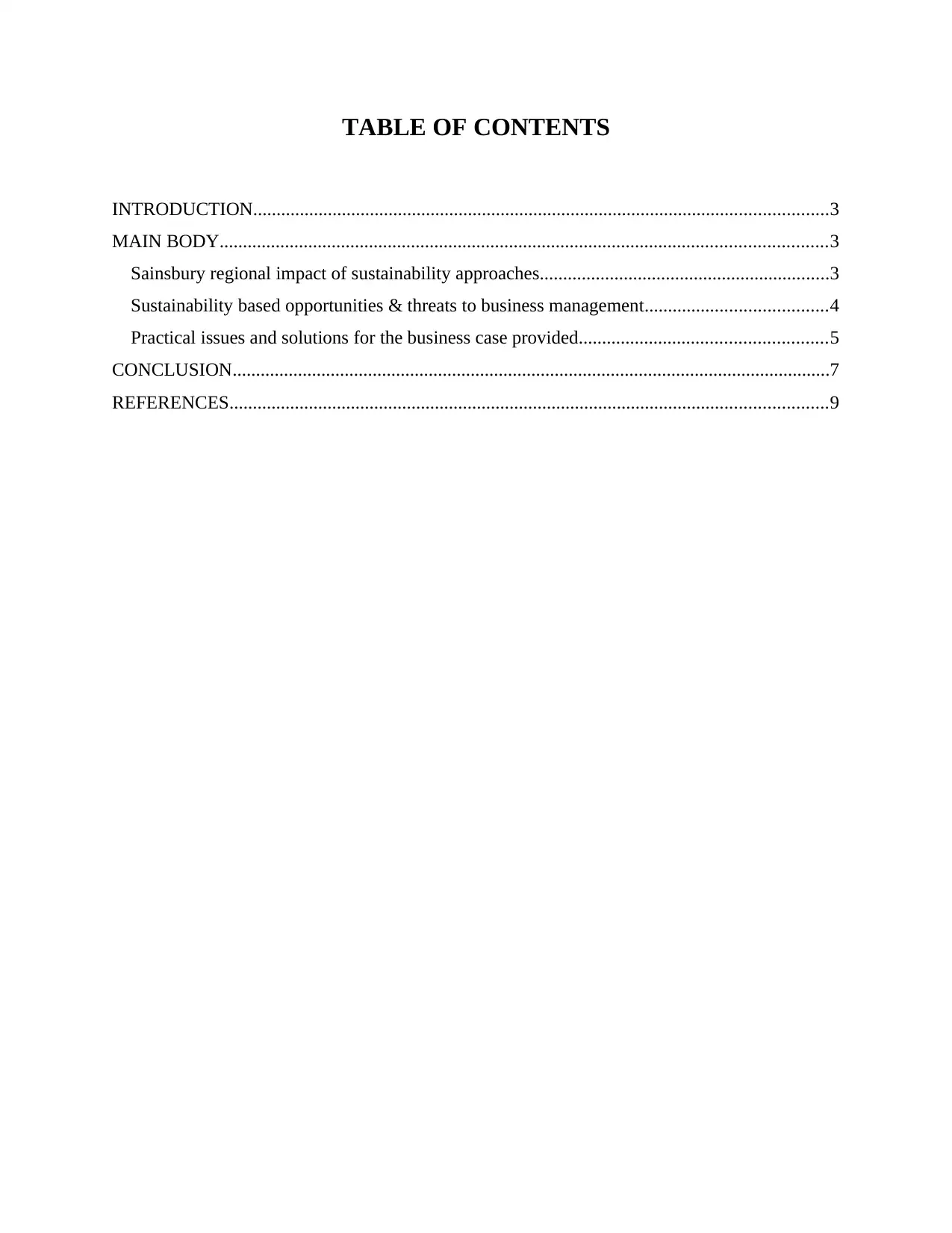
TABLE OF CONTENTS
INTRODUCTION...........................................................................................................................3
MAIN BODY..................................................................................................................................3
Sainsbury regional impact of sustainability approaches..............................................................3
Sustainability based opportunities & threats to business management.......................................4
Practical issues and solutions for the business case provided.....................................................5
CONCLUSION................................................................................................................................7
REFERENCES................................................................................................................................9
INTRODUCTION...........................................................................................................................3
MAIN BODY..................................................................................................................................3
Sainsbury regional impact of sustainability approaches..............................................................3
Sustainability based opportunities & threats to business management.......................................4
Practical issues and solutions for the business case provided.....................................................5
CONCLUSION................................................................................................................................7
REFERENCES................................................................................................................................9
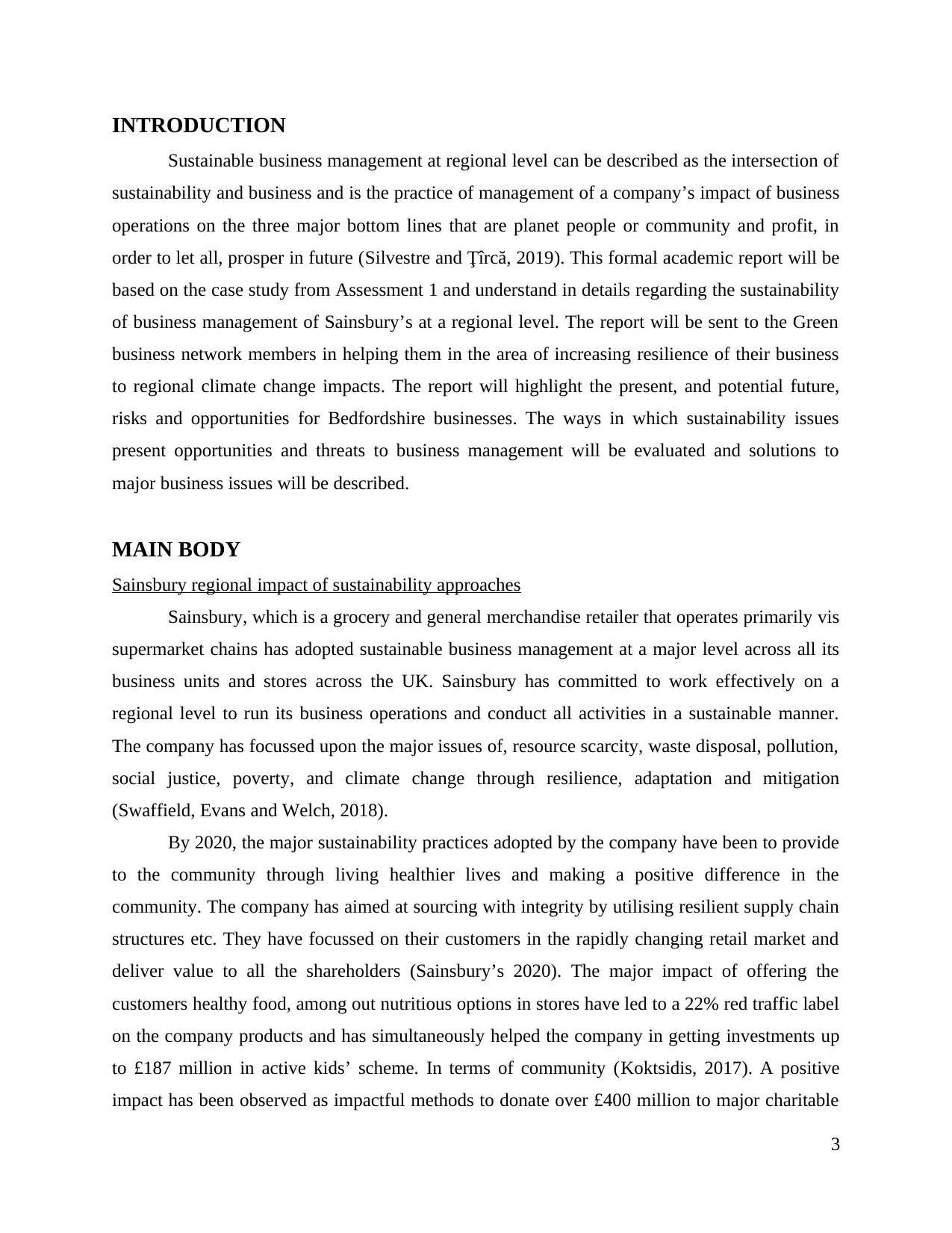
INTRODUCTION
Sustainable business management at regional level can be described as the intersection of
sustainability and business and is the practice of management of a company’s impact of business
operations on the three major bottom lines that are planet people or community and profit, in
order to let all, prosper in future (Silvestre and Ţîrcă, 2019). This formal academic report will be
based on the case study from Assessment 1 and understand in details regarding the sustainability
of business management of Sainsbury’s at a regional level. The report will be sent to the Green
business network members in helping them in the area of increasing resilience of their business
to regional climate change impacts. The report will highlight the present, and potential future,
risks and opportunities for Bedfordshire businesses. The ways in which sustainability issues
present opportunities and threats to business management will be evaluated and solutions to
major business issues will be described.
MAIN BODY
Sainsbury regional impact of sustainability approaches
Sainsbury, which is a grocery and general merchandise retailer that operates primarily vis
supermarket chains has adopted sustainable business management at a major level across all its
business units and stores across the UK. Sainsbury has committed to work effectively on a
regional level to run its business operations and conduct all activities in a sustainable manner.
The company has focussed upon the major issues of, resource scarcity, waste disposal, pollution,
social justice, poverty, and climate change through resilience, adaptation and mitigation
(Swaffield, Evans and Welch, 2018).
By 2020, the major sustainability practices adopted by the company have been to provide
to the community through living healthier lives and making a positive difference in the
community. The company has aimed at sourcing with integrity by utilising resilient supply chain
structures etc. They have focussed on their customers in the rapidly changing retail market and
deliver value to all the shareholders (Sainsbury’s 2020). The major impact of offering the
customers healthy food, among out nutritious options in stores have led to a 22% red traffic label
on the company products and has simultaneously helped the company in getting investments up
to £187 million in active kids’ scheme. In terms of community (Koktsidis, 2017). A positive
impact has been observed as impactful methods to donate over £400 million to major charitable
3
Sustainable business management at regional level can be described as the intersection of
sustainability and business and is the practice of management of a company’s impact of business
operations on the three major bottom lines that are planet people or community and profit, in
order to let all, prosper in future (Silvestre and Ţîrcă, 2019). This formal academic report will be
based on the case study from Assessment 1 and understand in details regarding the sustainability
of business management of Sainsbury’s at a regional level. The report will be sent to the Green
business network members in helping them in the area of increasing resilience of their business
to regional climate change impacts. The report will highlight the present, and potential future,
risks and opportunities for Bedfordshire businesses. The ways in which sustainability issues
present opportunities and threats to business management will be evaluated and solutions to
major business issues will be described.
MAIN BODY
Sainsbury regional impact of sustainability approaches
Sainsbury, which is a grocery and general merchandise retailer that operates primarily vis
supermarket chains has adopted sustainable business management at a major level across all its
business units and stores across the UK. Sainsbury has committed to work effectively on a
regional level to run its business operations and conduct all activities in a sustainable manner.
The company has focussed upon the major issues of, resource scarcity, waste disposal, pollution,
social justice, poverty, and climate change through resilience, adaptation and mitigation
(Swaffield, Evans and Welch, 2018).
By 2020, the major sustainability practices adopted by the company have been to provide
to the community through living healthier lives and making a positive difference in the
community. The company has aimed at sourcing with integrity by utilising resilient supply chain
structures etc. They have focussed on their customers in the rapidly changing retail market and
deliver value to all the shareholders (Sainsbury’s 2020). The major impact of offering the
customers healthy food, among out nutritious options in stores have led to a 22% red traffic label
on the company products and has simultaneously helped the company in getting investments up
to £187 million in active kids’ scheme. In terms of community (Koktsidis, 2017). A positive
impact has been observed as impactful methods to donate over £400 million to major charitable
3
⊘ This is a preview!⊘
Do you want full access?
Subscribe today to unlock all pages.

Trusted by 1+ million students worldwide
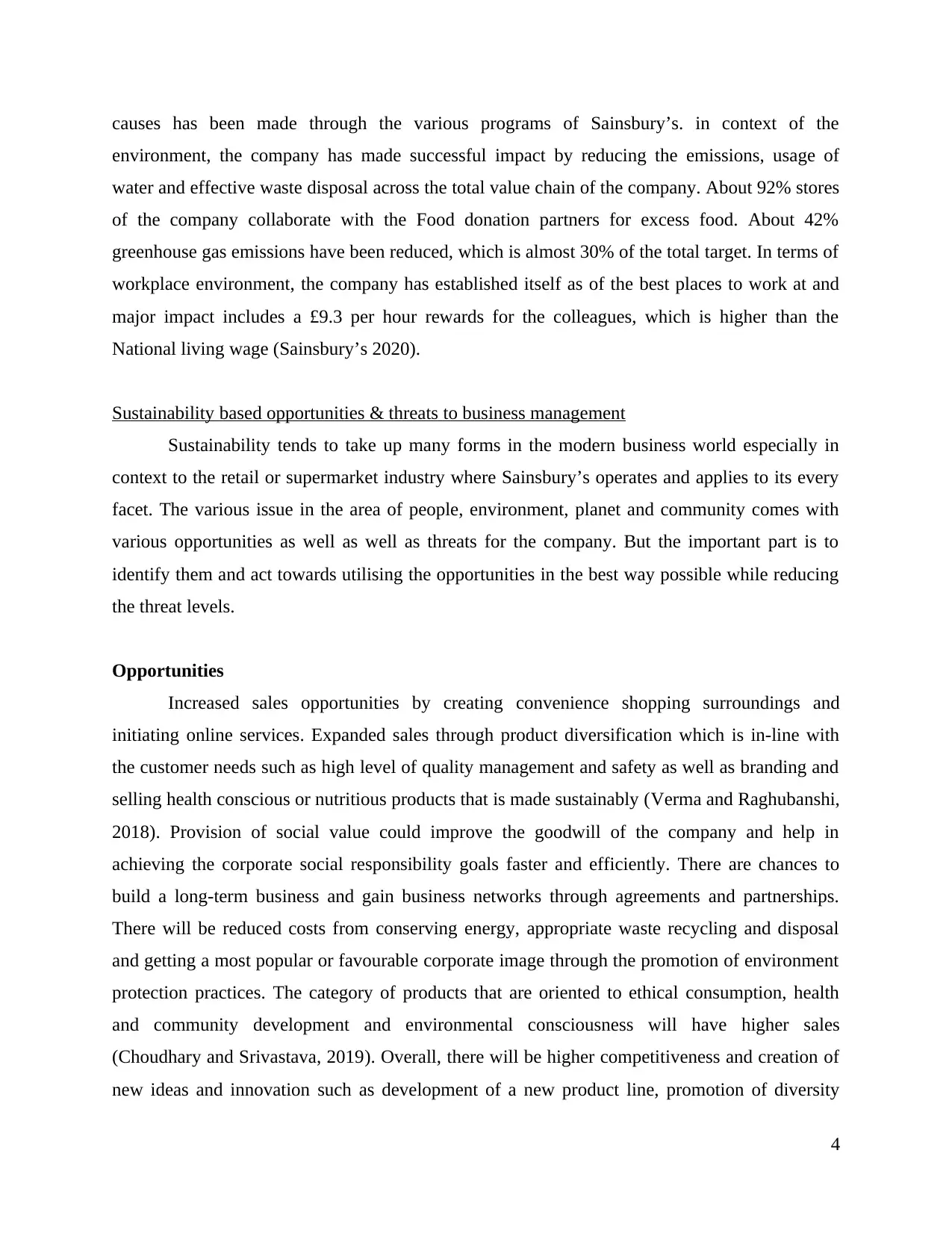
causes has been made through the various programs of Sainsbury’s. in context of the
environment, the company has made successful impact by reducing the emissions, usage of
water and effective waste disposal across the total value chain of the company. About 92% stores
of the company collaborate with the Food donation partners for excess food. About 42%
greenhouse gas emissions have been reduced, which is almost 30% of the total target. In terms of
workplace environment, the company has established itself as of the best places to work at and
major impact includes a £9.3 per hour rewards for the colleagues, which is higher than the
National living wage (Sainsbury’s 2020).
Sustainability based opportunities & threats to business management
Sustainability tends to take up many forms in the modern business world especially in
context to the retail or supermarket industry where Sainsbury’s operates and applies to its every
facet. The various issue in the area of people, environment, planet and community comes with
various opportunities as well as well as threats for the company. But the important part is to
identify them and act towards utilising the opportunities in the best way possible while reducing
the threat levels.
Opportunities
Increased sales opportunities by creating convenience shopping surroundings and
initiating online services. Expanded sales through product diversification which is in-line with
the customer needs such as high level of quality management and safety as well as branding and
selling health conscious or nutritious products that is made sustainably (Verma and Raghubanshi,
2018). Provision of social value could improve the goodwill of the company and help in
achieving the corporate social responsibility goals faster and efficiently. There are chances to
build a long-term business and gain business networks through agreements and partnerships.
There will be reduced costs from conserving energy, appropriate waste recycling and disposal
and getting a most popular or favourable corporate image through the promotion of environment
protection practices. The category of products that are oriented to ethical consumption, health
and community development and environmental consciousness will have higher sales
(Choudhary and Srivastava, 2019). Overall, there will be higher competitiveness and creation of
new ideas and innovation such as development of a new product line, promotion of diversity
4
environment, the company has made successful impact by reducing the emissions, usage of
water and effective waste disposal across the total value chain of the company. About 92% stores
of the company collaborate with the Food donation partners for excess food. About 42%
greenhouse gas emissions have been reduced, which is almost 30% of the total target. In terms of
workplace environment, the company has established itself as of the best places to work at and
major impact includes a £9.3 per hour rewards for the colleagues, which is higher than the
National living wage (Sainsbury’s 2020).
Sustainability based opportunities & threats to business management
Sustainability tends to take up many forms in the modern business world especially in
context to the retail or supermarket industry where Sainsbury’s operates and applies to its every
facet. The various issue in the area of people, environment, planet and community comes with
various opportunities as well as well as threats for the company. But the important part is to
identify them and act towards utilising the opportunities in the best way possible while reducing
the threat levels.
Opportunities
Increased sales opportunities by creating convenience shopping surroundings and
initiating online services. Expanded sales through product diversification which is in-line with
the customer needs such as high level of quality management and safety as well as branding and
selling health conscious or nutritious products that is made sustainably (Verma and Raghubanshi,
2018). Provision of social value could improve the goodwill of the company and help in
achieving the corporate social responsibility goals faster and efficiently. There are chances to
build a long-term business and gain business networks through agreements and partnerships.
There will be reduced costs from conserving energy, appropriate waste recycling and disposal
and getting a most popular or favourable corporate image through the promotion of environment
protection practices. The category of products that are oriented to ethical consumption, health
and community development and environmental consciousness will have higher sales
(Choudhary and Srivastava, 2019). Overall, there will be higher competitiveness and creation of
new ideas and innovation such as development of a new product line, promotion of diversity
4
Paraphrase This Document
Need a fresh take? Get an instant paraphrase of this document with our AI Paraphraser
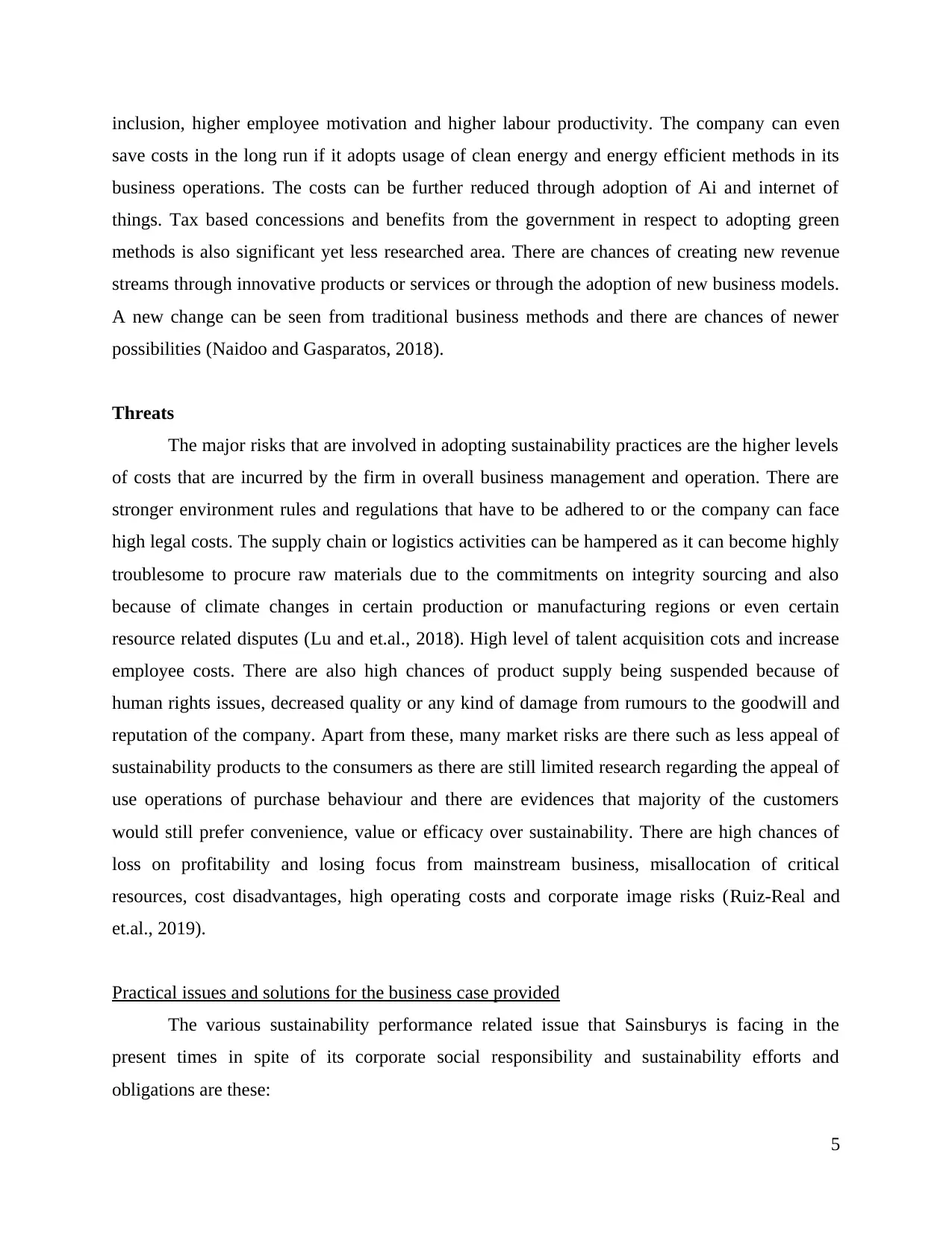
inclusion, higher employee motivation and higher labour productivity. The company can even
save costs in the long run if it adopts usage of clean energy and energy efficient methods in its
business operations. The costs can be further reduced through adoption of Ai and internet of
things. Tax based concessions and benefits from the government in respect to adopting green
methods is also significant yet less researched area. There are chances of creating new revenue
streams through innovative products or services or through the adoption of new business models.
A new change can be seen from traditional business methods and there are chances of newer
possibilities (Naidoo and Gasparatos, 2018).
Threats
The major risks that are involved in adopting sustainability practices are the higher levels
of costs that are incurred by the firm in overall business management and operation. There are
stronger environment rules and regulations that have to be adhered to or the company can face
high legal costs. The supply chain or logistics activities can be hampered as it can become highly
troublesome to procure raw materials due to the commitments on integrity sourcing and also
because of climate changes in certain production or manufacturing regions or even certain
resource related disputes (Lu and et.al., 2018). High level of talent acquisition cots and increase
employee costs. There are also high chances of product supply being suspended because of
human rights issues, decreased quality or any kind of damage from rumours to the goodwill and
reputation of the company. Apart from these, many market risks are there such as less appeal of
sustainability products to the consumers as there are still limited research regarding the appeal of
use operations of purchase behaviour and there are evidences that majority of the customers
would still prefer convenience, value or efficacy over sustainability. There are high chances of
loss on profitability and losing focus from mainstream business, misallocation of critical
resources, cost disadvantages, high operating costs and corporate image risks (Ruiz-Real and
et.al., 2019).
Practical issues and solutions for the business case provided
The various sustainability performance related issue that Sainsburys is facing in the
present times in spite of its corporate social responsibility and sustainability efforts and
obligations are these:
5
save costs in the long run if it adopts usage of clean energy and energy efficient methods in its
business operations. The costs can be further reduced through adoption of Ai and internet of
things. Tax based concessions and benefits from the government in respect to adopting green
methods is also significant yet less researched area. There are chances of creating new revenue
streams through innovative products or services or through the adoption of new business models.
A new change can be seen from traditional business methods and there are chances of newer
possibilities (Naidoo and Gasparatos, 2018).
Threats
The major risks that are involved in adopting sustainability practices are the higher levels
of costs that are incurred by the firm in overall business management and operation. There are
stronger environment rules and regulations that have to be adhered to or the company can face
high legal costs. The supply chain or logistics activities can be hampered as it can become highly
troublesome to procure raw materials due to the commitments on integrity sourcing and also
because of climate changes in certain production or manufacturing regions or even certain
resource related disputes (Lu and et.al., 2018). High level of talent acquisition cots and increase
employee costs. There are also high chances of product supply being suspended because of
human rights issues, decreased quality or any kind of damage from rumours to the goodwill and
reputation of the company. Apart from these, many market risks are there such as less appeal of
sustainability products to the consumers as there are still limited research regarding the appeal of
use operations of purchase behaviour and there are evidences that majority of the customers
would still prefer convenience, value or efficacy over sustainability. There are high chances of
loss on profitability and losing focus from mainstream business, misallocation of critical
resources, cost disadvantages, high operating costs and corporate image risks (Ruiz-Real and
et.al., 2019).
Practical issues and solutions for the business case provided
The various sustainability performance related issue that Sainsburys is facing in the
present times in spite of its corporate social responsibility and sustainability efforts and
obligations are these:
5
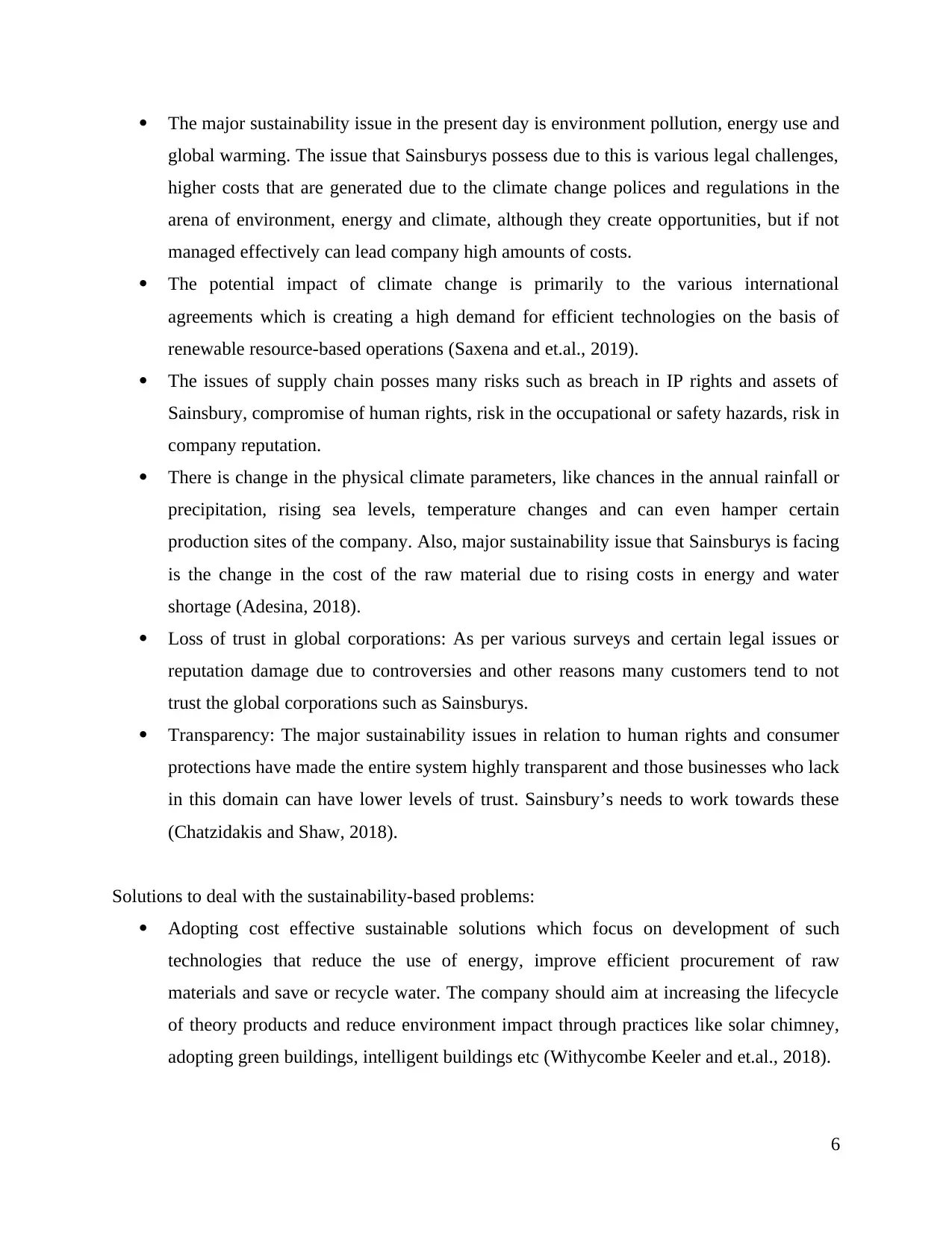
The major sustainability issue in the present day is environment pollution, energy use and
global warming. The issue that Sainsburys possess due to this is various legal challenges,
higher costs that are generated due to the climate change polices and regulations in the
arena of environment, energy and climate, although they create opportunities, but if not
managed effectively can lead company high amounts of costs.
The potential impact of climate change is primarily to the various international
agreements which is creating a high demand for efficient technologies on the basis of
renewable resource-based operations (Saxena and et.al., 2019).
The issues of supply chain posses many risks such as breach in IP rights and assets of
Sainsbury, compromise of human rights, risk in the occupational or safety hazards, risk in
company reputation.
There is change in the physical climate parameters, like chances in the annual rainfall or
precipitation, rising sea levels, temperature changes and can even hamper certain
production sites of the company. Also, major sustainability issue that Sainsburys is facing
is the change in the cost of the raw material due to rising costs in energy and water
shortage (Adesina, 2018).
Loss of trust in global corporations: As per various surveys and certain legal issues or
reputation damage due to controversies and other reasons many customers tend to not
trust the global corporations such as Sainsburys.
Transparency: The major sustainability issues in relation to human rights and consumer
protections have made the entire system highly transparent and those businesses who lack
in this domain can have lower levels of trust. Sainsbury’s needs to work towards these
(Chatzidakis and Shaw, 2018).
Solutions to deal with the sustainability-based problems:
Adopting cost effective sustainable solutions which focus on development of such
technologies that reduce the use of energy, improve efficient procurement of raw
materials and save or recycle water. The company should aim at increasing the lifecycle
of theory products and reduce environment impact through practices like solar chimney,
adopting green buildings, intelligent buildings etc (Withycombe Keeler and et.al., 2018).
6
global warming. The issue that Sainsburys possess due to this is various legal challenges,
higher costs that are generated due to the climate change polices and regulations in the
arena of environment, energy and climate, although they create opportunities, but if not
managed effectively can lead company high amounts of costs.
The potential impact of climate change is primarily to the various international
agreements which is creating a high demand for efficient technologies on the basis of
renewable resource-based operations (Saxena and et.al., 2019).
The issues of supply chain posses many risks such as breach in IP rights and assets of
Sainsbury, compromise of human rights, risk in the occupational or safety hazards, risk in
company reputation.
There is change in the physical climate parameters, like chances in the annual rainfall or
precipitation, rising sea levels, temperature changes and can even hamper certain
production sites of the company. Also, major sustainability issue that Sainsburys is facing
is the change in the cost of the raw material due to rising costs in energy and water
shortage (Adesina, 2018).
Loss of trust in global corporations: As per various surveys and certain legal issues or
reputation damage due to controversies and other reasons many customers tend to not
trust the global corporations such as Sainsburys.
Transparency: The major sustainability issues in relation to human rights and consumer
protections have made the entire system highly transparent and those businesses who lack
in this domain can have lower levels of trust. Sainsbury’s needs to work towards these
(Chatzidakis and Shaw, 2018).
Solutions to deal with the sustainability-based problems:
Adopting cost effective sustainable solutions which focus on development of such
technologies that reduce the use of energy, improve efficient procurement of raw
materials and save or recycle water. The company should aim at increasing the lifecycle
of theory products and reduce environment impact through practices like solar chimney,
adopting green buildings, intelligent buildings etc (Withycombe Keeler and et.al., 2018).
6
⊘ This is a preview!⊘
Do you want full access?
Subscribe today to unlock all pages.

Trusted by 1+ million students worldwide
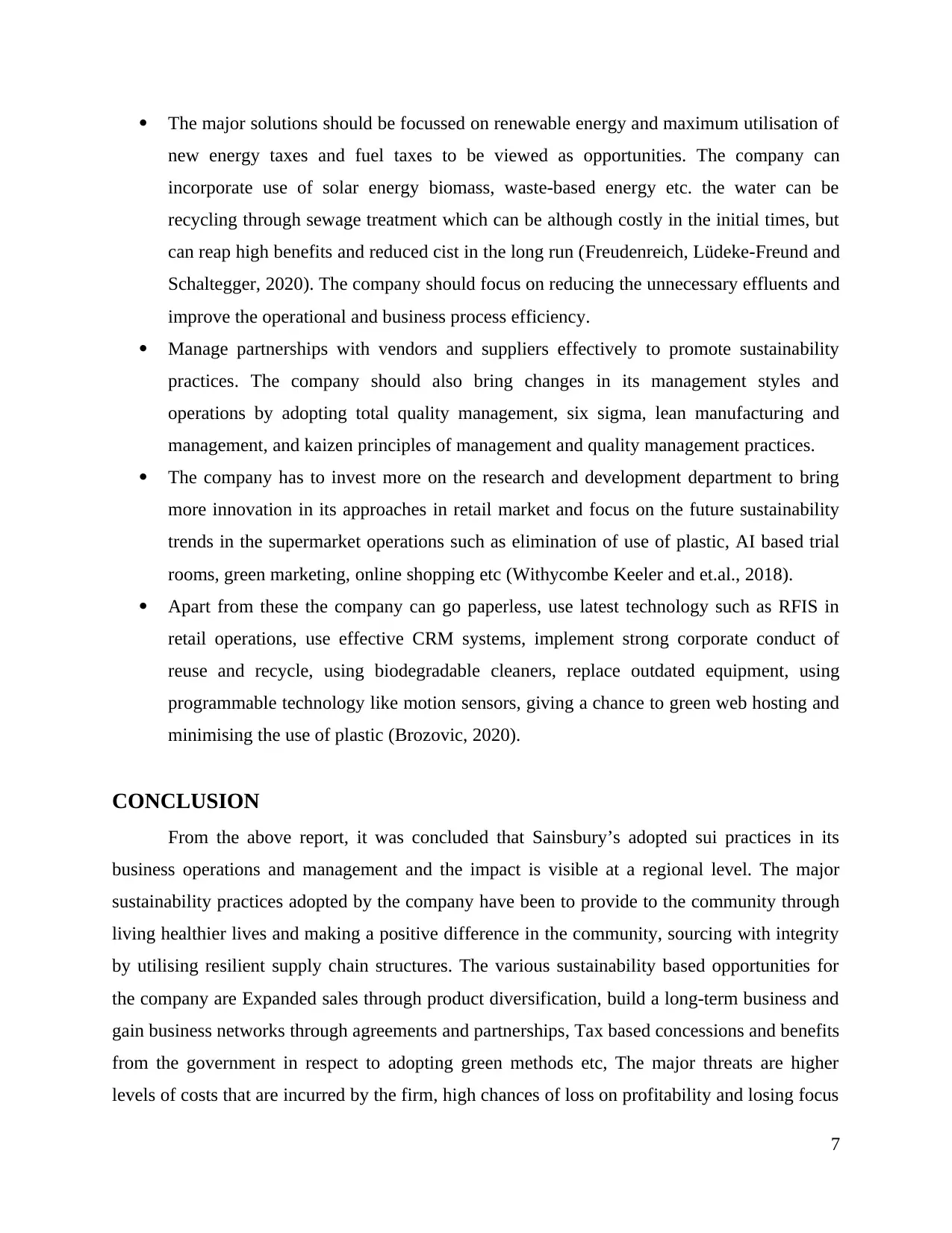
The major solutions should be focussed on renewable energy and maximum utilisation of
new energy taxes and fuel taxes to be viewed as opportunities. The company can
incorporate use of solar energy biomass, waste-based energy etc. the water can be
recycling through sewage treatment which can be although costly in the initial times, but
can reap high benefits and reduced cist in the long run (Freudenreich, Lüdeke-Freund and
Schaltegger, 2020). The company should focus on reducing the unnecessary effluents and
improve the operational and business process efficiency.
Manage partnerships with vendors and suppliers effectively to promote sustainability
practices. The company should also bring changes in its management styles and
operations by adopting total quality management, six sigma, lean manufacturing and
management, and kaizen principles of management and quality management practices.
The company has to invest more on the research and development department to bring
more innovation in its approaches in retail market and focus on the future sustainability
trends in the supermarket operations such as elimination of use of plastic, AI based trial
rooms, green marketing, online shopping etc (Withycombe Keeler and et.al., 2018).
Apart from these the company can go paperless, use latest technology such as RFIS in
retail operations, use effective CRM systems, implement strong corporate conduct of
reuse and recycle, using biodegradable cleaners, replace outdated equipment, using
programmable technology like motion sensors, giving a chance to green web hosting and
minimising the use of plastic (Brozovic, 2020).
CONCLUSION
From the above report, it was concluded that Sainsbury’s adopted sui practices in its
business operations and management and the impact is visible at a regional level. The major
sustainability practices adopted by the company have been to provide to the community through
living healthier lives and making a positive difference in the community, sourcing with integrity
by utilising resilient supply chain structures. The various sustainability based opportunities for
the company are Expanded sales through product diversification, build a long-term business and
gain business networks through agreements and partnerships, Tax based concessions and benefits
from the government in respect to adopting green methods etc, The major threats are higher
levels of costs that are incurred by the firm, high chances of loss on profitability and losing focus
7
new energy taxes and fuel taxes to be viewed as opportunities. The company can
incorporate use of solar energy biomass, waste-based energy etc. the water can be
recycling through sewage treatment which can be although costly in the initial times, but
can reap high benefits and reduced cist in the long run (Freudenreich, Lüdeke-Freund and
Schaltegger, 2020). The company should focus on reducing the unnecessary effluents and
improve the operational and business process efficiency.
Manage partnerships with vendors and suppliers effectively to promote sustainability
practices. The company should also bring changes in its management styles and
operations by adopting total quality management, six sigma, lean manufacturing and
management, and kaizen principles of management and quality management practices.
The company has to invest more on the research and development department to bring
more innovation in its approaches in retail market and focus on the future sustainability
trends in the supermarket operations such as elimination of use of plastic, AI based trial
rooms, green marketing, online shopping etc (Withycombe Keeler and et.al., 2018).
Apart from these the company can go paperless, use latest technology such as RFIS in
retail operations, use effective CRM systems, implement strong corporate conduct of
reuse and recycle, using biodegradable cleaners, replace outdated equipment, using
programmable technology like motion sensors, giving a chance to green web hosting and
minimising the use of plastic (Brozovic, 2020).
CONCLUSION
From the above report, it was concluded that Sainsbury’s adopted sui practices in its
business operations and management and the impact is visible at a regional level. The major
sustainability practices adopted by the company have been to provide to the community through
living healthier lives and making a positive difference in the community, sourcing with integrity
by utilising resilient supply chain structures. The various sustainability based opportunities for
the company are Expanded sales through product diversification, build a long-term business and
gain business networks through agreements and partnerships, Tax based concessions and benefits
from the government in respect to adopting green methods etc, The major threats are higher
levels of costs that are incurred by the firm, high chances of loss on profitability and losing focus
7
Paraphrase This Document
Need a fresh take? Get an instant paraphrase of this document with our AI Paraphraser

from mainstream business, misallocation of critical resources, cost disadvantages, high operating
costs and corporate image risks etc. The major issues in this business case are environment
pollution, energy use and global warming, legal challenges, corporate image risk, impact of
climate change etc. Various solutions were provided such as adopting cost effective methods,
energy efficiency business process, adopting total quality management etc.
8
costs and corporate image risks etc. The major issues in this business case are environment
pollution, energy use and global warming, legal challenges, corporate image risk, impact of
climate change etc. Various solutions were provided such as adopting cost effective methods,
energy efficiency business process, adopting total quality management etc.
8
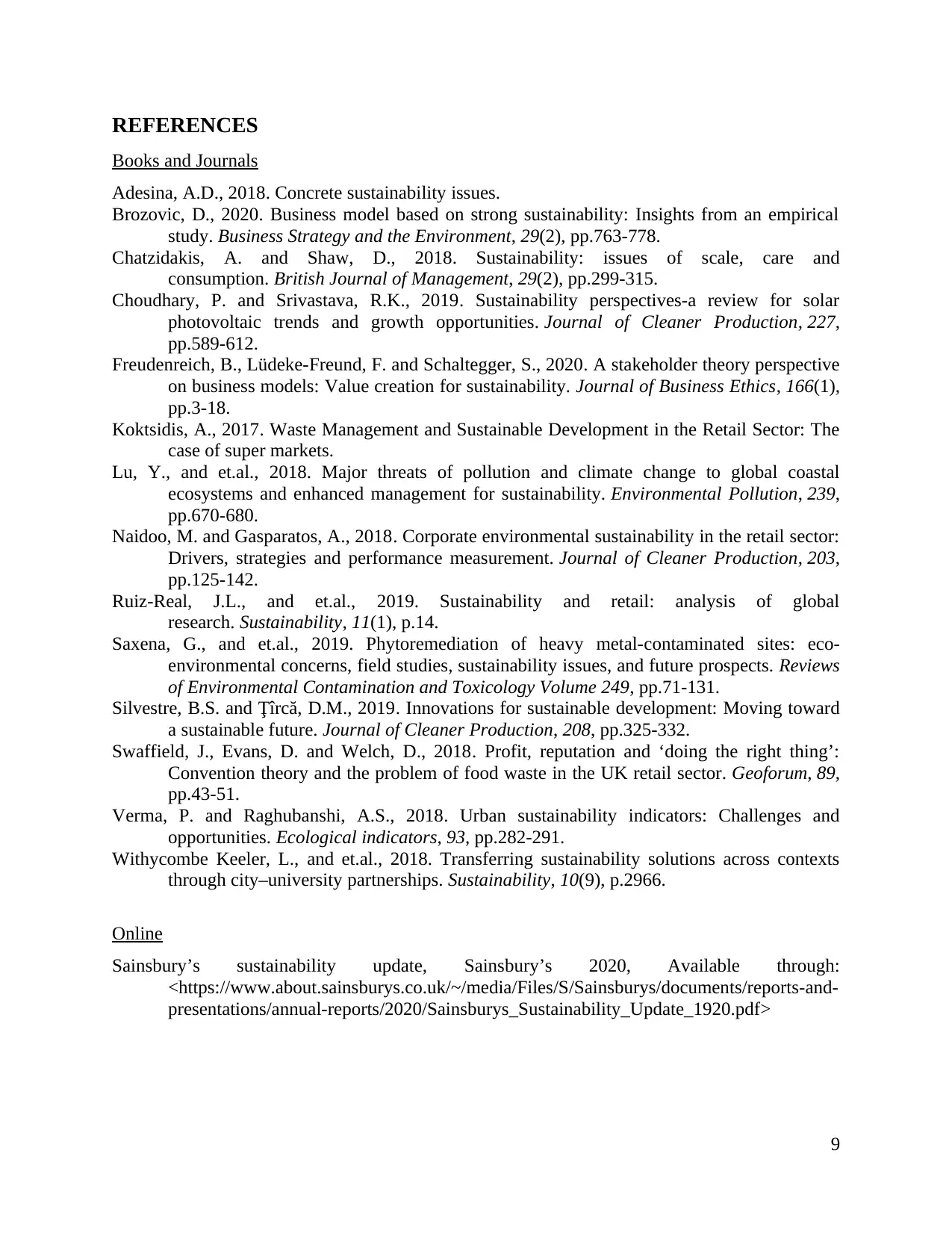
REFERENCES
Books and Journals
Adesina, A.D., 2018. Concrete sustainability issues.
Brozovic, D., 2020. Business model based on strong sustainability: Insights from an empirical
study. Business Strategy and the Environment, 29(2), pp.763-778.
Chatzidakis, A. and Shaw, D., 2018. Sustainability: issues of scale, care and
consumption. British Journal of Management, 29(2), pp.299-315.
Choudhary, P. and Srivastava, R.K., 2019. Sustainability perspectives-a review for solar
photovoltaic trends and growth opportunities. Journal of Cleaner Production, 227,
pp.589-612.
Freudenreich, B., Lüdeke-Freund, F. and Schaltegger, S., 2020. A stakeholder theory perspective
on business models: Value creation for sustainability. Journal of Business Ethics, 166(1),
pp.3-18.
Koktsidis, A., 2017. Waste Management and Sustainable Development in the Retail Sector: The
case of super markets.
Lu, Y., and et.al., 2018. Major threats of pollution and climate change to global coastal
ecosystems and enhanced management for sustainability. Environmental Pollution, 239,
pp.670-680.
Naidoo, M. and Gasparatos, A., 2018. Corporate environmental sustainability in the retail sector:
Drivers, strategies and performance measurement. Journal of Cleaner Production, 203,
pp.125-142.
Ruiz-Real, J.L., and et.al., 2019. Sustainability and retail: analysis of global
research. Sustainability, 11(1), p.14.
Saxena, G., and et.al., 2019. Phytoremediation of heavy metal-contaminated sites: eco-
environmental concerns, field studies, sustainability issues, and future prospects. Reviews
of Environmental Contamination and Toxicology Volume 249, pp.71-131.
Silvestre, B.S. and Ţîrcă, D.M., 2019. Innovations for sustainable development: Moving toward
a sustainable future. Journal of Cleaner Production, 208, pp.325-332.
Swaffield, J., Evans, D. and Welch, D., 2018. Profit, reputation and ‘doing the right thing’:
Convention theory and the problem of food waste in the UK retail sector. Geoforum, 89,
pp.43-51.
Verma, P. and Raghubanshi, A.S., 2018. Urban sustainability indicators: Challenges and
opportunities. Ecological indicators, 93, pp.282-291.
Withycombe Keeler, L., and et.al., 2018. Transferring sustainability solutions across contexts
through city–university partnerships. Sustainability, 10(9), p.2966.
Online
Sainsbury’s sustainability update, Sainsbury’s 2020, Available through:
<https://www.about.sainsburys.co.uk/~/media/Files/S/Sainsburys/documents/reports-and-
presentations/annual-reports/2020/Sainsburys_Sustainability_Update_1920.pdf>
9
Books and Journals
Adesina, A.D., 2018. Concrete sustainability issues.
Brozovic, D., 2020. Business model based on strong sustainability: Insights from an empirical
study. Business Strategy and the Environment, 29(2), pp.763-778.
Chatzidakis, A. and Shaw, D., 2018. Sustainability: issues of scale, care and
consumption. British Journal of Management, 29(2), pp.299-315.
Choudhary, P. and Srivastava, R.K., 2019. Sustainability perspectives-a review for solar
photovoltaic trends and growth opportunities. Journal of Cleaner Production, 227,
pp.589-612.
Freudenreich, B., Lüdeke-Freund, F. and Schaltegger, S., 2020. A stakeholder theory perspective
on business models: Value creation for sustainability. Journal of Business Ethics, 166(1),
pp.3-18.
Koktsidis, A., 2017. Waste Management and Sustainable Development in the Retail Sector: The
case of super markets.
Lu, Y., and et.al., 2018. Major threats of pollution and climate change to global coastal
ecosystems and enhanced management for sustainability. Environmental Pollution, 239,
pp.670-680.
Naidoo, M. and Gasparatos, A., 2018. Corporate environmental sustainability in the retail sector:
Drivers, strategies and performance measurement. Journal of Cleaner Production, 203,
pp.125-142.
Ruiz-Real, J.L., and et.al., 2019. Sustainability and retail: analysis of global
research. Sustainability, 11(1), p.14.
Saxena, G., and et.al., 2019. Phytoremediation of heavy metal-contaminated sites: eco-
environmental concerns, field studies, sustainability issues, and future prospects. Reviews
of Environmental Contamination and Toxicology Volume 249, pp.71-131.
Silvestre, B.S. and Ţîrcă, D.M., 2019. Innovations for sustainable development: Moving toward
a sustainable future. Journal of Cleaner Production, 208, pp.325-332.
Swaffield, J., Evans, D. and Welch, D., 2018. Profit, reputation and ‘doing the right thing’:
Convention theory and the problem of food waste in the UK retail sector. Geoforum, 89,
pp.43-51.
Verma, P. and Raghubanshi, A.S., 2018. Urban sustainability indicators: Challenges and
opportunities. Ecological indicators, 93, pp.282-291.
Withycombe Keeler, L., and et.al., 2018. Transferring sustainability solutions across contexts
through city–university partnerships. Sustainability, 10(9), p.2966.
Online
Sainsbury’s sustainability update, Sainsbury’s 2020, Available through:
<https://www.about.sainsburys.co.uk/~/media/Files/S/Sainsburys/documents/reports-and-
presentations/annual-reports/2020/Sainsburys_Sustainability_Update_1920.pdf>
9
⊘ This is a preview!⊘
Do you want full access?
Subscribe today to unlock all pages.

Trusted by 1+ million students worldwide
1 out of 9
Related Documents
Your All-in-One AI-Powered Toolkit for Academic Success.
+13062052269
info@desklib.com
Available 24*7 on WhatsApp / Email
![[object Object]](/_next/static/media/star-bottom.7253800d.svg)
Unlock your academic potential
Copyright © 2020–2026 A2Z Services. All Rights Reserved. Developed and managed by ZUCOL.





